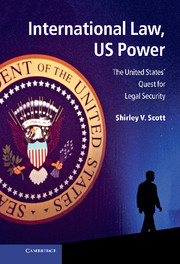Book contents
- Frontmatter
- Contents
- Acknowledgements
- Introduction: beyond the myth of the golden age
- 1 The US quest for legal security
- 2 The US pursuit of legal security through the evolution of the international law of dispute resolution
- 3 The US pursuit of legal security through the evolving regime relating to the use of force
- 4 The US pursuit of legal security in substantive policy arenas
- 5 Techniques through which the United States has reconciled its practice of offensive legal security with the principle of sovereign equality
- 6 The practice of offensive legal security in US diplomacy
- 7 The future of US engagement with international law
- Appendix
- Select bibliography
- Index
- References
6 - The practice of offensive legal security in US diplomacy
Published online by Cambridge University Press: 05 June 2012
- Frontmatter
- Contents
- Acknowledgements
- Introduction: beyond the myth of the golden age
- 1 The US quest for legal security
- 2 The US pursuit of legal security through the evolution of the international law of dispute resolution
- 3 The US pursuit of legal security through the evolving regime relating to the use of force
- 4 The US pursuit of legal security in substantive policy arenas
- 5 Techniques through which the United States has reconciled its practice of offensive legal security with the principle of sovereign equality
- 6 The practice of offensive legal security in US diplomacy
- 7 The future of US engagement with international law
- Appendix
- Select bibliography
- Index
- References
Summary
The United States, since its formation, has led in promoting a reign of law and justice as between nations.
John Foster Dulles, 1946Much of this book has focused on US involvement in the development of specific regimes of international law. We have seen that the United States has worked hard to get favourable systemic rules in place as well as taking extreme care with the detail of the specific substantive legal obligations it has assumed or not assumed. We have briefly considered a range of techniques that has facilitated the United States succeeding on many occasions – although no claim has been made that the United States has always been able to get all that it wanted in terms of the content of international law. Promoting an ideal of international law has gone some way towards masking the instrumental use of international law on the part of the United States. This chapter will explore ways in which the United States has invoked international law in its diplomacy, a subject that has been inadequately analysed by the scholarly community. This is the dimension of the US quest for legal security in which there has possibly been the greatest variation over time.
The political sway of international law
The fact that so much of this book has focused on the systemic and substantive content of international law begs the question of what the point is of US officials paying such close attention to the specific obligations assumed or not assumed by it and others. One possible reply to this is: ‘Not very much; international law in any case lacks effective enforcement mechanisms. The United States seems to have disregarded international law when it wanted to, and so have others. It does not really seem to have mattered to the United States whether international law prohibited the use of force, and those who have been subjected to US attack were not saved by Article 2(4).’ This response is unconvincing. If international law had been considered of such little consequence it is highly doubtful that the United States would have invested so heavily in the system and its evolution. One does not have to claim that the United States has always complied with its international law obligations to acknowledge the seriousness with which the United States regards legal obligations and the prevalence of law in the conduct of its foreign relations.
- Type
- Chapter
- Information
- International Law, US PowerThe United States' Quest for Legal Security, pp. 202 - 232Publisher: Cambridge University PressPrint publication year: 2012



